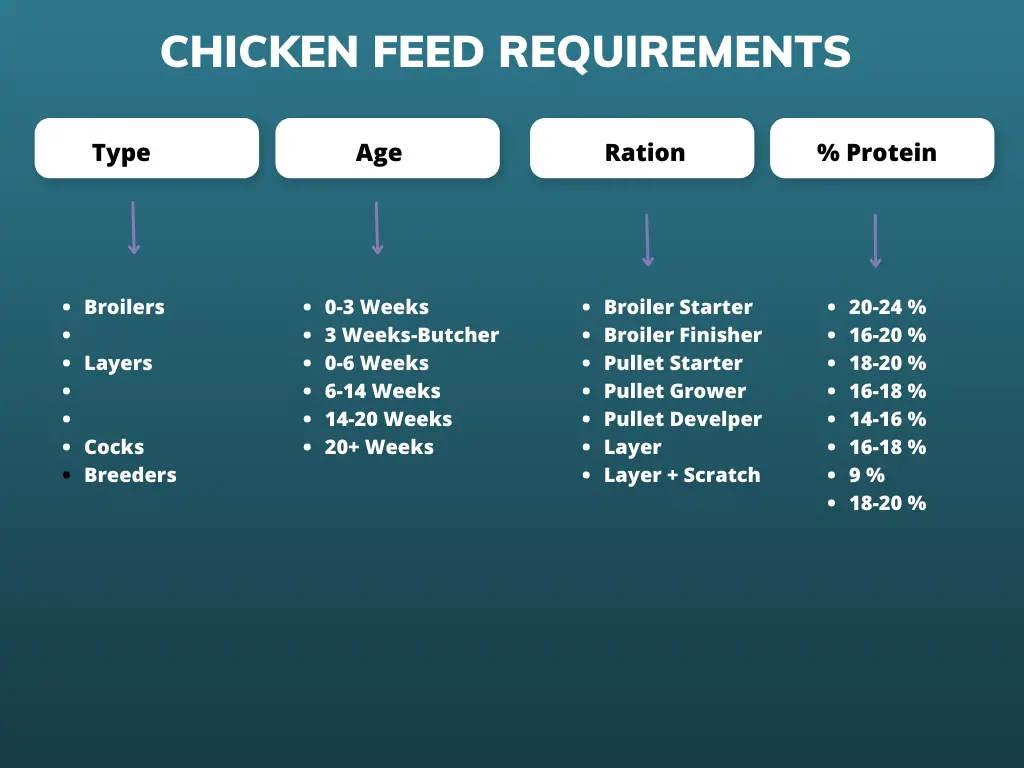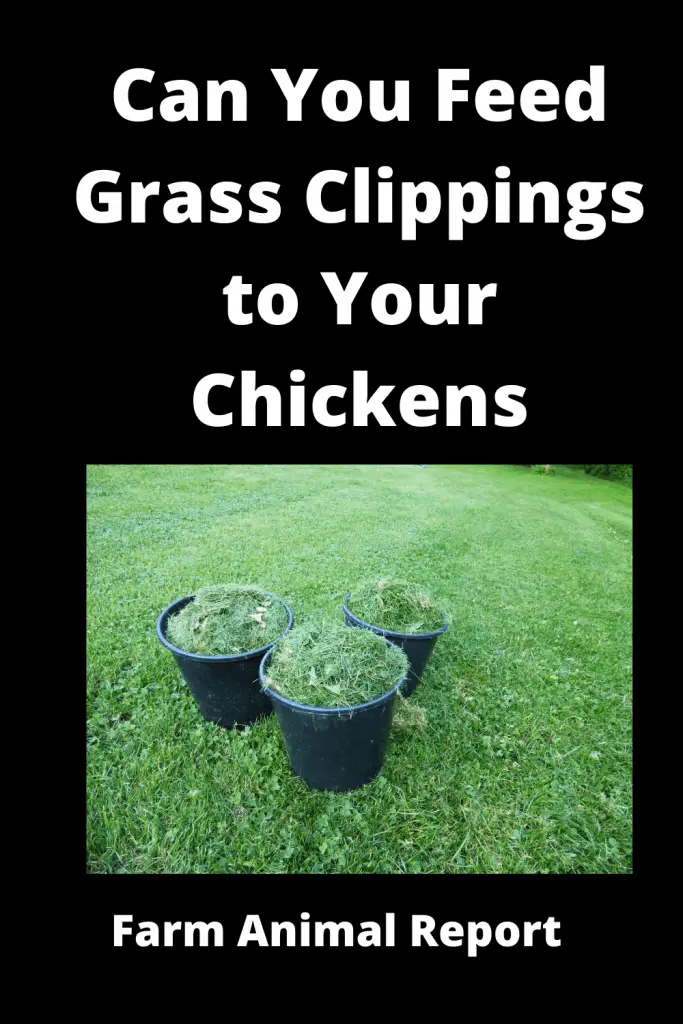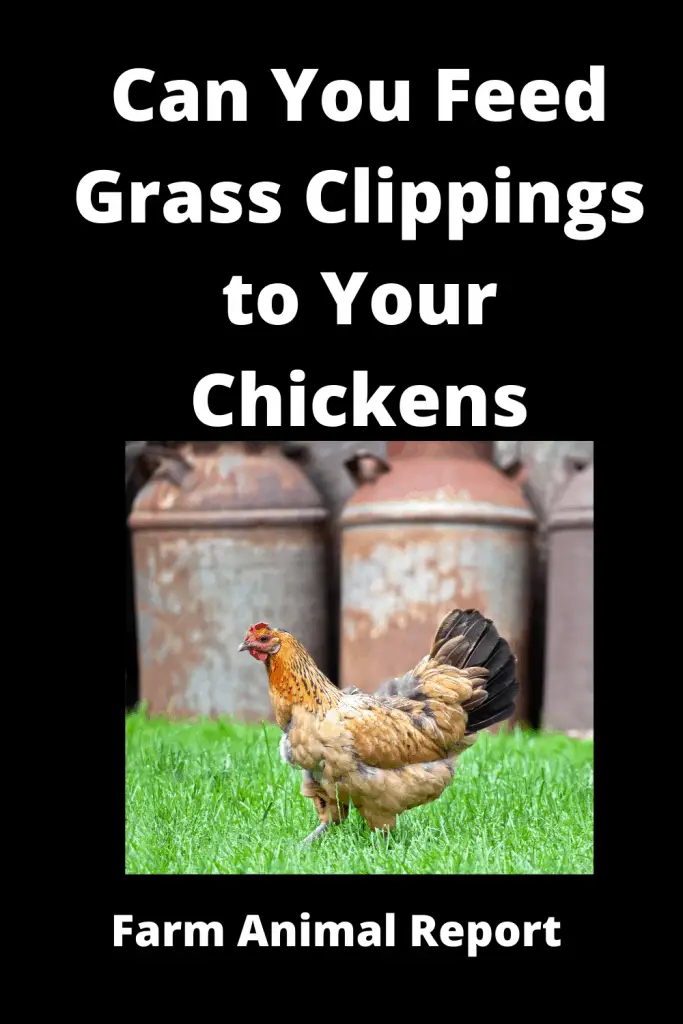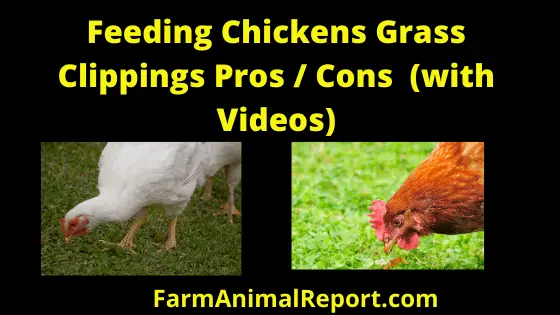Do Chickens Eat Grass?
As a General Rule Chickens love Grass Clippings especially in Hot Weather. Benefits 1) 2 to 3 times more vitamin A 2) Three times more vitamin E 3) has more vitamin A, E, K, and B6 4) increased their vitamin D. 5) Legumes and clover provide the nitrogen-rich protein that helps build organs, muscles, and tissue. 6) Seven times more beta carotene
Nutritional Benefits of Chickens Eating Grass Clippings
- There is ½ less cholesterol
- ¼ less saturated fat
- 2 to 3 times more vitamin A
- More omega-3 and omega-6 fatty acids.
- Three times more vitamin E
- Seven times more beta carotene.
- A chicken who forage has more vitamin A, E, K, and B6 in their systems as the added sunshine from grass foraging increased their vitamin D.
- Legumes and clover provide the nitrogen-rich protein that helps build organs, muscles, and tissue.
- The grass is an excellent source of fiber that helps maintain a healthy digestive system.
- Total less saturated fat
Do Chickens Eat Grass – There are two schools of thought about the feeding of grass ( lawn clippings ) clipping to your chickens. One idea is that some people say that it is better to feed grass for your chicken eating grass because chickens love to graze grass. It is viewed as a treat. They not only love to eat it they love to scratch and dig for bugs.
Paragraph For Amazon Resources for Raising Meat Chickens
Another thought about this is that some people say that it is bad for your chickens to feed them grass clipping.

Now, we will discuss these two kinds of thoughts, one by one.

Can You Feed Grass Clippings to Your Chickens / Pros
- Chickens love grass clippings, especially in hot weather.
- If you have mowed the lawn, you can put out a large bowl filled with icy water and grass clippings.
- They will love the grass, and the cold water will help to bring down their body temp.
- Your hens become crazy when they go to your grassy lawn.
- They love eating the freshly clipped grass in your lawn.
- Your hens get a mower bag full of grass clipping every time the lawn is mowed. You just dump it out in the run in a pile. They like to play queen of the grass mountain and much away on as much as they would like, then spread the rest around searching for bugs.
- Excellent entertainment and you have been doing it for years without any crop impaction.
- Crop inaction wouldn’t worry you much. Whenever you clean your barns, you may put the hay and stuff in the compost pen, and male and female chickens get to go in and compost. You will never face any problems with feeding grass.
- You can add water to grass clippings and keep it in a plastic tote to prevent the chicken from scratching and to keep it last longer.
- Some of your hens will even follow the mower! You also give them all of the weeds, that you pull out of the gardens and let them forage for the few worms and grubs that make it into the bucket.
12 Ways to Make Money by Chicken Farming—Extensive Guidelines for Chicken Farmers
Nutritional Benefits of Chickens Eating Grass Clippings
Types of Grass Clippings Suitable For Chickens:
Do Chickens Eat Grass – Some of the common grass types that are good for chickens are crabgrass and clover, spring grass is the best, but since that only occurs a few months out of the years, any weeds thriving and sprouting are suitable for your chickens.
4 Ways to Start Using Grass Clippings for Chicken feed
There are the following ways to start composting grass clippings:
1. Spread the Clippings around Your Garden Beds as Much
Make sure to spread the fresh clippings thinly, so they dry out properly. Grass that is wet and decaying will give off ammonia, and you don’t want that. If you know how to lay mulch, mulching with grass clippings adds needed nitrogen to the soil, helps add a layer of mulch that retains moisture in the ground, and also is good for the microbes and worms who feed off of the clippings as they break down. Chicken love to dig, spread, scratch which is all good for your gardens.

2. Compost Them for later use When Cools down / Do not Feed These to your Chickens
If you know how to make compost and keep a compost pile, then you can start composting grass clippings only by tossing them in to break down and compost. If your collection is not cooking well, the hot nitrogen from the grass clippings can kick it up a notch. Just be careful not to dump in loads of wet grass as it can get slimy in there so if you have lots of wet grass as it can get slimy in there so if you have lots of damp grass, try letting it dry out a bit before adding it to the compost pile. Problems, as it decomposes being so deep, will become hot, moist good opportunities for harmful molds to grow.
3. Add the Clippings to Chicken Coop and Run
First, the chickens will love you. The grass is an important feed crop for your chickens and provides nutrients that are good for them and make eggs more nutritious and yolks richer in color. After you spread it on the floor of the Coop or Run, they spread the grass clippings, they make a high mulch layer that improves the soil quality in the chicken run and helps keep the dust down in dry months.
Keep that grass pesticide-free if giving it to your chickens.
You would have to treat it like hay ( timothy hay ) or straw and make sure it is dried out well. If you are worried about crawling pests, sprinkle some DE in there with it
4. Leave the Clippings Right on the Lawn / Let Your Chickens work over Your Lawn
Nitrogen is an essential nutrient for the green lawn, and as the clippings break down and release the nitrogen, it will help feed the lawn. This is an excellent tip in fall and spring to organically feed your lawn. They will sort through and spread all your clippings. The scratching and digging help work that mulch down through your lawn. So you can double dip. Good for your lawn / Good for your Chickens
Green lawns take a lot of work and resources to maintain, so use those clippings to save you money and help feed and sustain your chickens.
Dumping Grass Clippings in the Run for Chickens to Forage Through?
Your hens love to roam the yard and consume every piece of green material, but you are not able let them roam. You might want to dump grass clippings straight from the mower into their run. It would give them something to munch on and dig through to keep them interested when we can’t let them out.
You should throw the grass clippings in your hen run, it should be large (40 by 40ft), and you should use the ground of your chicken run like a gigantic composting floor. The hens turn the compost daily and also supplement the fertilizer with their droppings.
If you have a run and are worried about predators, you can put chicken wire over the top to protect them. If you are worried about chickens destroying the grass and roots, you can also put chicken wire on the floor and that provides a base for the clippings to lay on as the chicken scratch through it.
You can also plant purselane, barley, white clover, wild spinach, stinging nettle, alfalfa, for them to eat.
Cons / Feeding Grass Clippings to your Chickens
- The grass is good for treats – Better to give your chickens a balanced diet with Needed Vitamins and supplements
- Chicken has different Nutrient requirements for life stages – chicks-Growers-Layers-Roosters
- If wet can Produce mold problems
- Chickens normally tear small pieces of grass naturally – the possibility of gorging on grass too long to properly digest.
- Pesticides on Grass / Weed Killers / Fertilizers
- Gas and Oil contamination from Mowing
- Chickens George themselves
Do Chickens Keep Grass Short?
Chickens are great landscapers. They keep your yard tidy by eating bugs and scratching the ground in their search for food, which turns into fertilizer that keeps grass healthy and lush. Chickens can also be used to eat debris like fallen leaves, which helps cut down on mowing time. Finally chickens will help you build healthy soil; their manure is a good source of fertilizer and their scratching will turn it into compost that can be used in your yard.
They don’t necessarily keep grass short, but they do help keep it healthy.
Cons – More Detailed on Chicken Food
Most people will find this advice counter-intuitive because chickens love to eat grasses, right?
- However, when chickens eat grass, they nip off the tip of the blade, they eat tiny pieces, a little at a time. Putting a big pile of lawn clippings will give them longer pieces that they’ll overeat of, all at once.
- What can happen is that the long-fibrous strands from the mower get bound up in the digestive system and cause a blockage. They can get tied in knots that won’t pass, and the blockage can be fatal if not treated. Don’t offer grass clippings to your chickens unless they are very finely mulched, and even provide just a scattered handful at a time.
- Some people don’t recommend feeding your new baby chicks treats right away because they should first learn what their feed is so they will be able to get a balanced, nutritious diet, and it’s essential to give your chicks a good start in life.
- Keep in mind that if mother hen raises the baby chicks, she will get them to eat anything edible that she eats, right from the beginning. There is never an age that they are too young for free-ranging or eating some specific food. The big thing is to make sure they eat and that their diet is nutritious enough for them. They increase and need a lot of nutrition, so if they eat mostly treats, they may not get the balance of vitamins and minerals they need. When eating anything other than their finely milled starter, they will need the grit to digest it properly.
- That said, the bulk of their diet should be a starter, not treats, the same way an adult chicken’s diet needs to be mostly her regular layer pellet or crumble rather than scratch. Whether baby chicks can eat scratch may depend slightly on the size of the piece-chick starter that has finely ground corn, grains, etc. already. There is nothing different about feeding them corn separately, except in the size of the piece and in the amount of corn they eat. Corn doesn’t have many vitamins or much protein, so it is found in a tiny proportion of their balanced chick starter. Larger pieces of dent corn will be harder for small chicks to manage and digest properly. Use your common sense when deciding which treats to offer, and err on the side of caution, for sure. The last thing you want is to give your chicks digestive issues such as crop binding.
- Scratch is not a complete diet and will be bad for your chickens, the same way feeding your kids a strict food of potato chips and cheese curls would be. The best diet for your chickens is a nutritionally balanced feed along with natural forage. They find themselves in the right quantities. Chicks are just baby chickens and have the same need. If not more so, of a balanced diet.
- You can get experience while treating your hens with sunflower seeds; she engaged her week old chicks to eat some of her treats. They were excellent, because they had plenty of girts, and the seeds were small and few.
- Many people make the mistake of giving their hens a healthy treat of long strands of cut grass. While grass is undoubtedly good for chickens, they don’t naturally eat it in long strands, which is how many people offer it, long lawn clippings. In the natural order of things, chickens nip off little pieces, which are easy to digest. Long cut strands can be gobbled up fast, then they may wrap around each other and clog their digestive system.
- Your chickens trust you; so be sure to offer them only what is in reasonably sized pieces. Always make sure that your chickens have plenty of appropriately sized grit. And remember, oyster shells are for calcium, not for digestion.
Final Thoughts
- Use wisdom and Moderation
- No Pesticides / Fertilizers
- Cut grass into small pieces Nothing Moldy
- Mobile coops work well
- Provide rest of balance feed needed for proper nutrition
Chicken / Poultry Breeder Associations
| Rabbit Association | Location | Link |
|---|---|---|
| US Poultry & Egg Association | United States | USPA |
| American Poultry Association | California | APA |
| Ohio Poultry Association | Ohio | OPA |
| National Chicken Council | United States | NCC |
| British Poultry Council | United Kingdom | BPCE |
| Poultry Club of Great Britain | United Kingdom | PCGB |
| Association of Poultry Breeders in EU | Europe | AVEC |
| Australian Chicken Meat Federation Inc | Australia | ACMF |
| Australian Poultry Hub | Australia | Poultry Hub |





